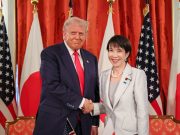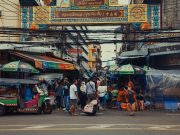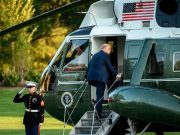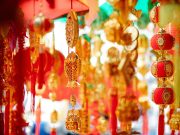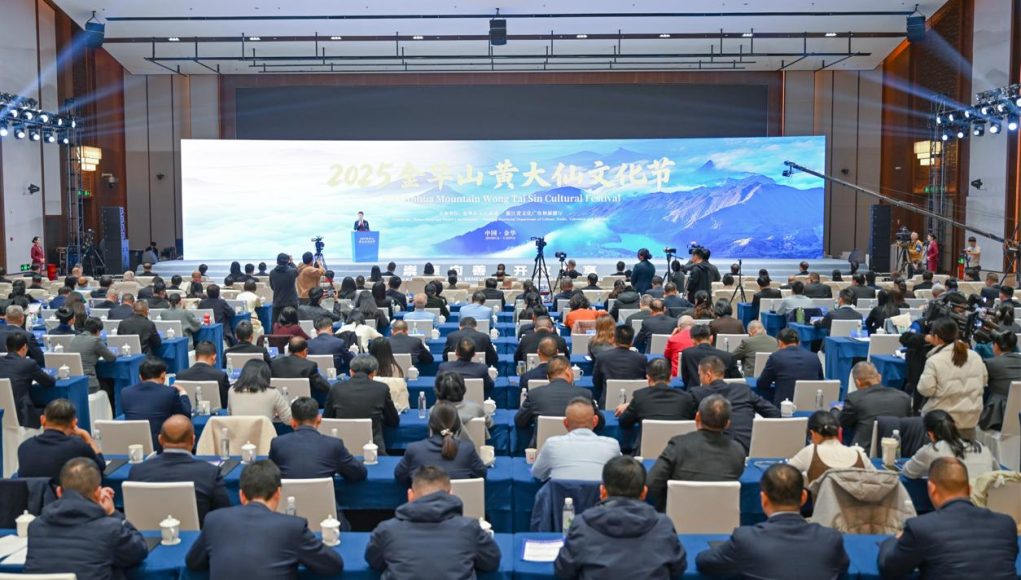(Singapore, 28.11.2025) Themed “Upholding virtue and benevolence, Embracing Openness and Sharing (崇德向善 开放共享)”, the 2025 Jinhua Mountain Wong Tai Sin Cultural Festival was held in Jinhua, Zhejiang Province from November 25 to 27. Hosted by the Jinhua Government and Zhejiang Provincial Department of Culture and Tourism, the event attracted over 200 guests from home and abroad to attend and explore its inheritance and development of culture.
Wang Changrong, Vice Chairman of Zhejiang Provincial Political Consultative Conference and Deputy Secretary of the Party Leadership Group of Zhejiang Province; Zhu Chonglie, Secretary of the Jinhua Municipal Party Committee; Wang Hui, Director of the Ethnic and Religious Affairs Committee of Zhejiang Province; Zhang Guangzhou, Deputy Director of the Zhejiang Provincial Department of Culture and Tourism, and others delivered speeches. Alice Mak Mei-kuen, Secretary for Home and Youth Affairs of the Hong Kong Special Administrative Region Government; Bao Xiuying, Deputy Minister of the United Front Work Department of the CPC Zhejiang Provincial Committee; Lou Bingwen, Director of the Ethnic and Religious Affairs Committee of Zhejiang Provincial CPPCC; Yao Guowen, Deputy Director of the Department of Foreign Affairs (Hong Kong and Macao Affairs Office) of Zhejiang Province; and Jinhua municipal leaders Zhang Jian, Chen Lingling, and Ye Weihong, among others, attended the event.
Originating from the foothills of the Jiangnan region, the Wong Tai Sin culture will move towards a broader arena for dialogue among civilizations, injecting new and vibrant practices into Zhejiang’s efforts to build a high-level culturally strong province and promote the construction of modern Chinese civilization, helping to creatively transform and innovatively develop outstanding traditional Chinese culture, and jointly promoting cultural exchange and mutual learning.
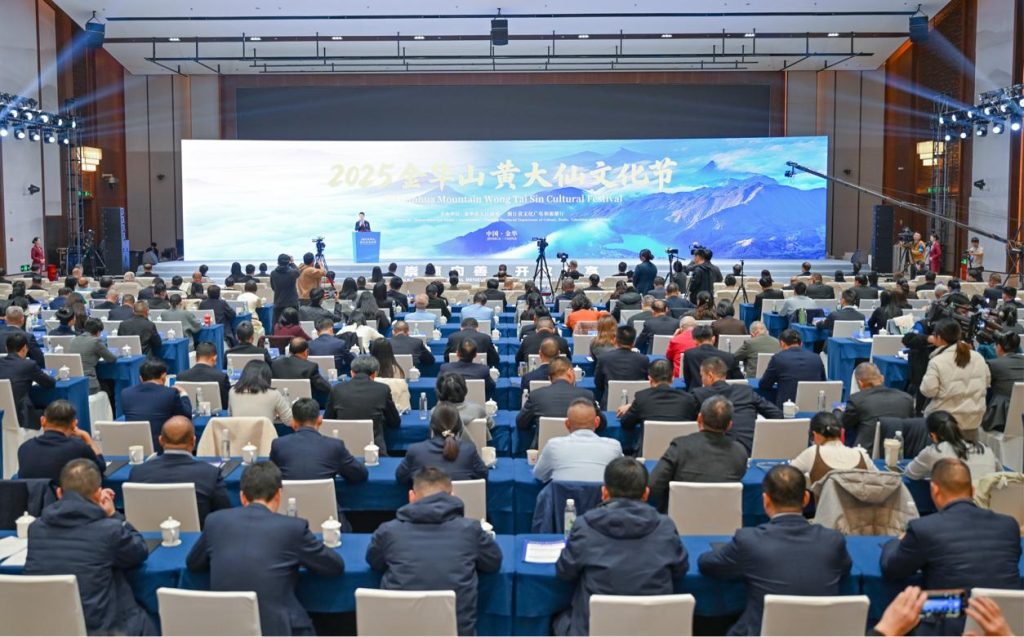
Tracing the Origins: Cultural Echoes Across Mountains and Seas
It’s said that during the Eastern Jin Dynasty, a shepherd boy named Huang Chuping was “enlightened” by an immortal master and practiced diligently on Jinhua Mountain. After “attaining enlightenment”, Huang Chuping remained true to his original aspiration of “benefiting the world”. This legend is deeply loved by the people, and the ancestral temple of Wong Tai Sin still exists on Jinhua Mountain.
In 2008, the legend of Huang Chuping (Wong Tai Sin) was included in the list of national intangible cultural heritage representative projects.
Today, Wong Tai Sin culture has left its “footprints” in over 30 countries and regions, including China’s Hong Kong, Macao, and Taiwan regions, as well as Singapore, Malaysia, the United States, and Russia, becoming an important spiritual bond connecting overseas Chinese around the world.
Focusing on the “inheritance and development of Wong Tai Sin culture”, Zhan Shichuang, a professor at Sichuan University and Dean of the Laozi Research Institute; Xiao Fang, a professor at the School of Sociology of Beijing Normal University and an expert in the China’s National Intangible Cultural Heritage Expert Database; and Zheng Yumin, an advisor to the Zhejiang Business Association, delivered keynote speeches one after another at the opening ceremony on November 26.
At the opening ceremony, Zhu Chonglie, Secretary of the Jinhua Municipal Party Committee, said in his speech that Jinhua will continue to promote openness and sharing, actively integrate into the country’s overall opening-up strategy, establish and improve a regular cooperation mechanisms with Hong Kong, Macao, Taiwan, and overseas Chinese communities, continuously broaden the channels for exchanges and interactions between Jinhua and compatriots from Hong Kong, Macao, Taiwan, and overseas Chinese, and continuously enhance the influence of brand events such as the “Wong Tai Sin Cultural Festival” and “Overseas Youth Visiting Jinhua”.
Jinhua will promote exchanges and mutual learning with an “open” attitude, strengthen dialogue and cooperation with the concept of “sharing”, further deepen the consensus of “same roots and same origin”, and strengthen the bond of “shared dreams”.
Crossing the Seas Together: Marching From Jinhua Mountain to the World
At the opening ceremony, the 2025 Jinhua Mountain Wong Tai Sin Cultural Festival launched several significant initiatives, marking a new stage for Wong Tai Sin culture towards experiential and international development.
Among them, the launch of the International Exchange and Cooperation for Wong Tai Sin Culture and the Wong Tai Sin Culture Ten-Thousand-Person Experience Plan aims to connect cultural dissemination nodes such as Jinhua, Guangdong, Hong Kong, Macao, Thailand, and Malaysia into a network, outlining a “cross-regional cultural corridor” extending from the source to overseas.
Travel agents from overseas and China’s Hong Kong and Macao regions will work with its counterparts in Zhejiang Province and Jinhua City to organize inspections and refine route designs, planning to bring ten thousand people to Jinhua to experience Wong Tai Sin culture within two years.
Subsequently, the strategic cooperation project for the systematic excavation and international dissemination of Wong Tai Sin Culture was launched.
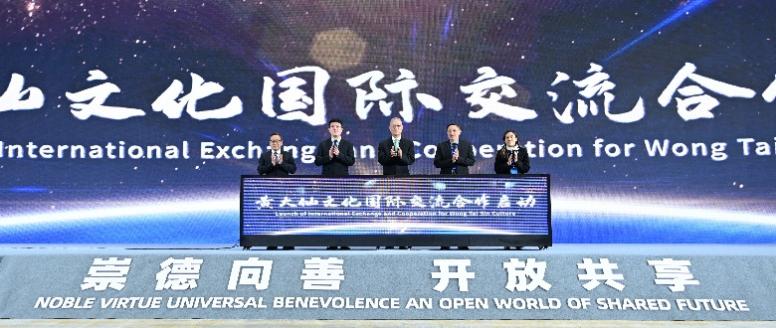
Focusing on core areas such as “Wong Tai Sin cultural research and value interpretation”, “Strategic planning for the development of Wong Tai Sin culture”, “Cultivation of cultural and tourism interdisciplinary talents”, “Establishment of international communication platform”, “Innovation in international communication content and forms” and “Construction of a cluster of distinctive industry-academia-research bases”, multiple parties reaching a consensus on cooperation.
The “Upholding Virtue and Benevolence, Embracing Openness and Sharing” initiative was released at the event, and jointly signed by representatives from home and abroad, calling for the continued deepening of humanistic exchanges, mutual learning among civilizations, and the dissemination of good deeds on a global scale.
This not only highlights the public welfare value of the event but also injects new impetus into its efforts to build an international discourse platform and promote civilizational dialogue.
In addition, Yau Chi-On, a member of the Hong Kong Intangible Cultural Heritage Project Committee and Associate Professor of Chinese Literature at Hong Kong Chu Hai College; Zhu Yidan, Vice Director of the Macao Zhejiang-Jiangsu-Shanghai Fellowship Association and director of its Youth Committee; and Luo Xiao, a young teacher at Zhejiang Normal University and Doctor of Art Theory from the China Academy of Art, engaged in thematic exchanges on the “Open Inheritance and Sharing Practice of Wong Tai Sin culture”.
“This cultural festival organically integrates the folk belief culture of Wong Tai Sin with excellent traditional Chinese culture, contributing to the construction of a community with a shared future for mankind by stimulating the contemporary value of Wong Tai Sin culture.
This is a vivid practice of our efforts to focus on ‘enhancing the dissemination and influence of Chinese civilization’ during the 15th Five-Year Plan period, and to continuously improve the appeal of Chinese culture and the influence of Chinese civilization,” said Wang Hui, Director of the Ethnic and Religious Affairs Committee of Zhejiang Province, at the opening ceremony.
A Flow of Light and Shadow: Millennial Beliefs Resonate Globally in Jinhua
At the opening ceremony, Zhang Guangzhou, Deputy Director of the Zhejiang Provincial Department of Culture and Tourism, said that the core spirit of “upholding virtue and benevolence” in Wong Tai Sin culture has been passed down to this day and continues to shine with contemporary brilliance.
Zhang expressed his hope that the cultural festival would serve as a link to continuously strengthen the systematic protection of excellent traditional culture, deepen collaboration in the integration of culture and tourism, promote civilizational exchanges and mutual learning, open a new chapter in inheritance and development, and meticulously create more landmark achievements in the “creative transformation and innovative development” of excellent traditional culture.
In addition to the main venue activities, this year’s cultural festival also featured events such as the Wong Tai Sin Cultural and Art Appreciation, the Intangible Cultural Heritage Temple Fair, and Wong Tai Sin Cultural Experience activities.
The Wong Tai Sin Cultural and Art Appreciation used diverse media such as ancient and modern calligraphy and painting, works by renowned intangible cultural heritage artists, and IP-based cultural and creative products to present a three-dimensional imagery of Wong Tai Sin culture that has continued to develop since the Song and Yuan dynasties, allowing traditional cultural genes to be innovatively expressed in modern aesthetic contexts.
At the Intangible Cultural Heritage Temple Fair held in the ancient city of Wuzhou, traditional arts from the eight regions of Jinhua, such as Jinhua Daoqing (a form of storytelling), Wu Opera, and Xu’s Family Lanterns, were presented through a combination of performances, parades, and markets. On-site demonstrations of techniques such as ham curing, bamboo weaving, and tea etiquette further expanded the space and methods for the “revitalization” of cultural heritage.
The Wong Tai Sin Cultural Experience activities connected multiple cultural sites, allowing participants to deepen their understanding of Wong Tai Sin culture through on-site visits and situational experiences while “walking”.
From “static presentation” to “immersive experience”, a series of activities are promoting the contemporary significance of Wong Tai Sin culture in public life, making it not only a cultural symbol shared by the people but also an important bridge for communication between Chinese communities at home and abroad and for promoting civilizational dialogue.
“The Wong Tai Sin culture, originating in Jinhua, has profound cultural heritage. Its core value of ‘upholding virtue and benevolence’ is in line with the moral traditions of the Chinese nation, embodying a shared aspiration for a better life. It serves as an important emotional bridge connecting compatriots from Hong Kong, Macao, Taiwan and overseas Chinese,” said Wang Changrong, Vice Chairman of Zhejiang Provincial Political Consultative Conference and Deputy Secretary of the Party Leadership Group of Zhejiang Province.
He added that Zhejiang is currently at a crucial stage of thoroughly implementing the spirit of the Fourth Plenary Session of the 20th CPC Central Committee of China, planning the development blueprint for the 15th Five-Year Plan period, and striving to build a demonstration zone for common prosperity through high-quality development, it is even more necessary to use culture as a medium and exchanges as a bridge to draw the largest possible circle of unity.
By: Dong Yixin, CNS



